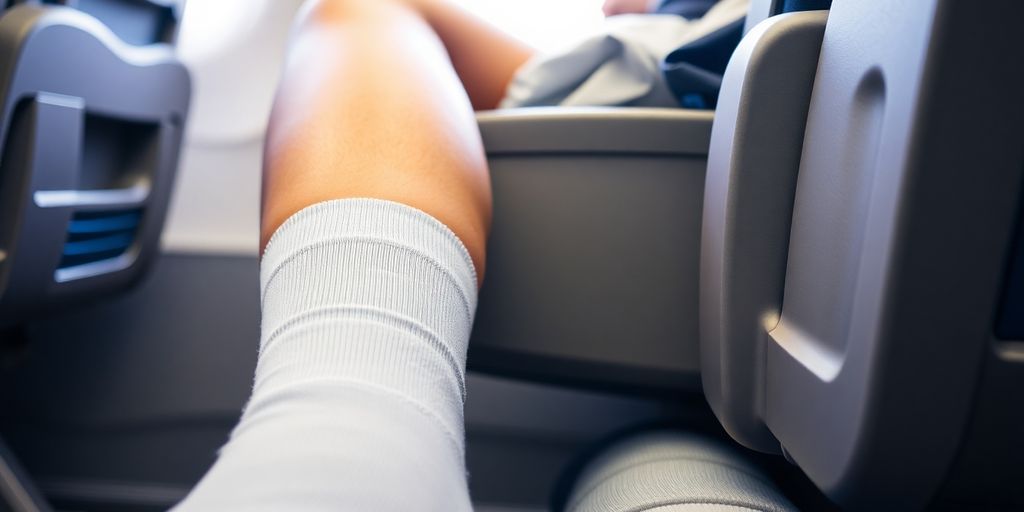So, you're expecting a baby, and suddenly everyone's talking about compression therapy. Maybe your legs feel heavy, or you're noticing some swelling. It's totally normal to wonder, is compression therapy good for pregnancy? This guide is here to clear things up, giving expecting mothers like you all the info on how compression can help you feel more comfortable and stay healthy during this special time.
Key Takeaways
- Compression stockings can help with common pregnancy issues like swollen legs and discomfort.
- Wearing compression garments daily, even in warm weather, can make a real difference.
- Always talk to your doctor before picking out compression stockings to make sure they're right for you.
- You might be able to get compression stockings through a prescription, and sometimes insurance helps cover the cost.
- Compression stockings are super helpful for travel, especially flying, to keep you safe and comfortable.
Understanding Compression Therapy During Pregnancy
Pregnancy brings a whole host of changes, and some of them aren't exactly comfortable. One common issue is swelling in the legs and ankles. That's where compression therapy comes in. It's a way to help manage some of these symptoms, but it's good to know why it works and what to expect.
Why Compression Stockings Are Beneficial
Compression stockings aren't just for older folks; they can be a real game-changer during pregnancy. They gently squeeze your legs, which helps improve blood flow. Think of it like this: pregnancy increases blood volume, but it can also make it harder for blood to travel back up from your legs. Compression stockings give your veins a little extra support, reducing the risk of blood clots and easing discomfort. They're especially helpful if you're on your feet a lot.
Addressing Common Pregnancy Symptoms
Pregnancy symptoms can be a real drag, right? Swollen ankles, varicose veins, and just plain tired legs are super common. Compression stockings can help with all of that. They reduce swelling by encouraging fluid to move back into your bloodstream. Plus, they can minimize the appearance of varicose veins and ease the achiness that comes with carrying extra weight. Some women even find that compression helps with nausea and dizziness, especially in early pregnancy. It's not a cure-all, but it can make a noticeable difference. Make sure you get the right compression garments for your needs.
The Role of Hormonal Changes
Hormones are all over the place during pregnancy, and they affect pretty much everything. One thing they do is relax the walls of your veins, which can make it harder for blood to circulate properly. This, combined with increased blood volume and the pressure from your growing uterus, can lead to swelling and discomfort in your legs. Compression stockings help counteract these hormonal effects by providing external support to your veins. It's like giving your circulatory system a helping hand when it needs it most.
During pregnancy, your body goes through some pretty intense changes. Compression therapy is a simple, non-invasive way to manage some of the less pleasant side effects, like swelling and achy legs. It's worth talking to your doctor about whether compression stockings are right for you.
When and How to Wear Compression Stockings
Daily Wear Guidelines for Expecting Mothers
Okay, so you've got your compression stockings. Now what? The general rule of thumb is to wear them daily for the best results. For optimal results, wear maternity compression socks early in the day, ideally before getting out of bed, when swelling is minimal. This prevents fluid from accumulating in your legs throughout the day. Think of it as a proactive measure, not just a reactive one.
Here's a simple routine to follow:
- Put them on first thing in the morning.
- Wear them throughout the day, especially if you'll be sitting or standing for extended periods.
- Take them off before bed to allow for normal circulation while you sleep.
It's important to listen to your body. If you experience any discomfort, such as numbness or tingling, remove the stockings immediately and consult with your doctor. Don't push through pain; it's your body's way of telling you something isn't right.
Wearing Compression Stockings in Summer
Summer heat can make wearing compression stockings feel like a form of torture, but it's actually when you need them most! Heat causes your blood vessels to dilate, which can worsen swelling and discomfort. The good news is that there are ways to make it bearable. Look for breathable materials like cotton or moisture-wicking fabrics. You can also try cooling gels or sprays specifically designed for use with compression stockings.
Consider these tips for summer wear:
- Choose a lighter compression level if you find the regular ones too constricting.
- Take breaks throughout the day to cool down your legs.
- Stay hydrated to help regulate your body temperature.
Tips for Donning and Doffing
Putting on and taking off compression stockings can be a workout in itself, especially with a growing belly! Here are some tricks to make the process easier:
- Use a donning aid: These devices can help you slide the stockings over your foot and ankle with less effort. Your doctor can prescribe donning and doffing aids if medically necessary.
- Try the plastic bag method: Place a plastic bag over your foot and ankle before putting on the stocking. This reduces friction and allows the stocking to slide on more easily. Once the stocking is in place, remove the bag.
- Sit down: Trying to put on compression stockings while standing can be difficult and tiring. Sit in a chair with good back support to make the process more comfortable.
- Roll them on: Instead of pulling the stocking up, try rolling it up your leg, bit by bit. This can help prevent bunching and ensure a more even distribution of compression.
Choosing the Right Compression Stockings

Consulting Your Healthcare Provider
Before you even think about buying compression stockings, chat with your doctor or midwife. Seriously, it's the most important step. They can assess your specific needs, taking into account any pre-existing conditions or pregnancy complications. They'll also be able to recommend the appropriate compression level for you. Don't just guess – get professional advice! Your doctor can also help you understand if you need a doctor's prescription for medical-grade stockings.
Factors to Consider for Optimal Fit
Getting the right fit is crucial for compression stockings to work effectively and comfortably. Here's what to keep in mind:
- Accurate Measurements: Measure your ankle circumference, calf circumference, and the length of your leg. Use a soft measuring tape and make sure it's snug but not too tight. Most brands have sizing charts based on these measurements.
- Compression Level: Compression levels are measured in mmHg (millimeters of mercury). Lower levels (8-15 mmHg) are good for mild symptoms, while higher levels (20-30 mmHg or 30-40 mmHg) are for more severe issues. Your doctor can advise on the right level.
- Material: Look for breathable materials like cotton or microfiber, especially if you're wearing them during warmer months. Some materials are also moisture-wicking, which can help prevent skin irritation.
- Style: Knee-high, thigh-high, or pantyhose styles are available. Knee-highs are usually sufficient for most pregnant women, but thigh-highs might be better if you have varicose veins higher up your leg. Pantyhose styles offer more support for the belly.
It's worth noting that ill-fitting compression stockings can be uncomfortable and even counterproductive. If they're too tight, they can restrict circulation; if they're too loose, they won't provide adequate compression. So, take your time and get it right.
Maternity-Specific Designs
Consider maternity-specific compression stockings. These are designed to accommodate your growing belly and provide extra support where you need it. They often have a wider waistband and more room in the abdominal area. Some even have adjustable features to customize the fit as your pregnancy progresses. These compression stockings for pregnancy can make a big difference in comfort, especially during the later stages.
Acquiring Compression Stockings for Pregnancy
Doctor's Prescription and Medical Supply Stores
Okay, so you're ready to get some compression stockings. Where do you even start? Well, ideally, your doctor should be the first stop. They can assess your specific needs and write a prescription if necessary. A prescription isn't always required, but it can be helpful, especially if you're looking to get insurance coverage.
Once you have a prescription (or even if you don't), head to a medical supply store. These places specialize in medical equipment and will have a much better selection of compression stockings than your average pharmacy. Plus, the staff are usually trained to help you find the right fit and compression level. Don't be shy about asking for help! They can measure your legs and make sure you get the right size.
Understanding Insurance Coverage and Costs
Let's talk money. Compression stockings can range in price, and it's important to understand what your insurance will cover. Call your insurance provider before you buy anything. Ask them specifically about coverage for compression stockings during pregnancy. Some plans cover them fully with a prescription, while others might only cover a portion, or none at all.
Here's a quick rundown of things to check with your insurance:
- Do you need a prescription for coverage?
- What percentage of the cost is covered?
- Are there any specific brands or types of stockings that are covered?
- Do you have a deductible to meet first?
It's always better to be informed upfront than to be surprised by a hefty bill later. Knowing your coverage helps you budget and make informed decisions about which stockings to purchase.
Exemption from Co-Payment for Pregnant Women
Here's some potentially good news! In some regions, pregnant women are exempt from co-payments on prescriptions for medical necessities, and this can include compression stockings. This is definitely something to look into. Ask your doctor or pharmacist about medical compression stockings and whether this exemption applies to you. It could save you a significant amount of money. If you are eligible, make sure to have the necessary documentation to prove your pregnancy when you pick up your prescription. It's worth checking out, right?
Compression Therapy and Travel During Pregnancy

Flying Safely with Compression Stockings
Planning a trip while pregnant? It can be exciting, but it's also important to think about your health, especially on long flights. Compression stockings are a great tool to help maintain good circulation during air travel. The pressure changes and prolonged sitting can increase the risk of blood clots, but compression stockings can help counteract these effects. Make sure to consult with your doctor before flying, especially if you have any pre-existing conditions.
Preventing Travel-Related Thrombosis
Pregnancy increases the risk of deep vein thrombosis (DVT), and long periods of immobility, like those experienced during travel, can further elevate this risk. Here's how compression stockings can help:
- Improve blood flow: They gently squeeze your legs, encouraging blood to return to your heart.
- Reduce swelling: They help prevent fluid from pooling in your ankles and feet.
- Minimize discomfort: They can alleviate the achiness and heaviness often felt after sitting for extended periods.
Wearing compression stockings is a simple yet effective way to protect yourself from travel-related thrombosis during pregnancy. Remember to also stay hydrated and take short walks when possible to further promote circulation.
Airline Regulations for Pregnant Travelers
Before booking your flight, it's a good idea to check the airline's policies regarding pregnant travelers. While most airlines allow pregnant women to fly, some may have restrictions based on how far along you are in your pregnancy. It's also wise to carry a letter from your doctor stating that you are fit to fly, especially if you are in your third trimester. Don't forget to pack your compression stockings in your carry-on bag for easy access. Some airlines may even recommend or require them for pregnant passengers. Always prioritize your health and safety when making travel plans during pregnancy.
Beyond Compression: Holistic Pregnancy Wellness
While compression stockings can be a big help during pregnancy, it's important to remember they're just one piece of the puzzle. Taking a well-rounded approach to your health will make a real difference in how you feel. Let's explore some other ways to support your body during this special time.
Recommended Exercises for Expecting Mothers
Staying active is good for both you and your baby, but it's important to choose exercises that are safe and appropriate for pregnancy. Always talk to your doctor before starting any new workout routine. Here are a few ideas:
- Walking: A simple and effective way to get your heart rate up.
- Swimming: Gentle on the joints and provides a full-body workout.
- Prenatal yoga: Improves flexibility, strength, and relaxation.
- Light weight training: Helps maintain muscle mass and strength (use light weights and focus on proper form).
The Importance of Pelvic Floor Exercises
Your pelvic floor muscles support your uterus, bladder, and bowels. Pregnancy and childbirth can weaken these muscles, leading to issues like incontinence. Doing pelvic floor exercises, also known as Kegels, can help strengthen them. Here's how:
- Identify your pelvic floor muscles: Imagine you're trying to stop the flow of urine.
- Squeeze those muscles: Hold for a few seconds, then relax.
- Repeat: Aim for 10-15 repetitions, several times a day.
It's easy to forget about pelvic floor exercises, but they're so important! Make them a part of your daily routine. You can do them while you're waiting in line, watching TV, or even sitting at your desk.
Maintaining an Active Lifestyle During Pregnancy
It's not just about formal exercise; it's about incorporating movement into your daily life. Here are some tips for maintaining an active lifestyle during pregnancy:
- Take the stairs instead of the elevator.
- Park further away from your destination and walk the rest of the way.
- Do some light housework or gardening.
- Get up and move around every hour if you have a desk job.
Remember to listen to your body and rest when you need to. Pregnancy is a marathon, not a sprint!
Wrapping Things Up: Compression Therapy and Your Pregnancy
So, we've gone over a lot about compression therapy and pregnancy. It's pretty clear that these stockings can be a real help for many expecting moms, especially with those swollen legs and the risk of blood clots. Remember, your body is doing some amazing things right now, and sometimes it needs a little extra support. Always talk to your doctor first to make sure compression therapy is right for you. They can give you the best advice for your situation. And don't forget, there are different kinds of stockings out there, so finding the right fit and style is important. Taking care of yourself during pregnancy is a big deal, and if compression therapy can make you feel a bit more comfortable, it's definitely worth looking into.
Frequently Asked Questions
Why are compression stockings helpful during pregnancy?
During pregnancy, your body goes through many changes. Your hormones shift, your blood volume increases, and you gain weight. All of these things can make your leg veins work harder, leading to issues like swollen legs, spider veins, and even varicose veins. Compression stockings help by gently squeezing your legs, which helps blood flow back to your heart and reduces these problems. They can also lower your risk of blood clots.
Can compression stockings help with morning sickness and dizziness?
Yes, they can! Many pregnant women feel dizzy or sick to their stomach, especially early on. Studies have shown that wearing compression stockings can really help with these symptoms. They are a safe and effective way to feel better during pregnancy, and many doctors recommend them.
How long and how often should I wear my compression stockings?
It's a good idea to wear your compression stockings every day, from the time you wake up until you go to bed. This is because pregnant women have a higher chance of getting blood clots. Taking them off at night is fine. Sometimes, it's even helpful to keep wearing them for a little while after your baby is born. Always talk to your doctor about what's best for you.
Should I wear compression stockings in the summer?
Even in warm weather, it's important to keep wearing your compression stockings. Heat can make your blood vessels expand, which can make swelling worse. Wearing them consistently, even in summer, will help keep your legs feeling lighter and more comfortable.
How do I choose the right compression stockings for pregnancy?
Your doctor is the best person to decide if you need compression stockings and what kind. They'll consider things like your skin and how much your legs swell. A specialist at a medical supply store can then measure you to make sure you get the right size and fit. There are even special maternity tights that grow with your belly!
How do I get compression stockings and what do they cost?
You can get compression stockings from a medical supply store. Your doctor (either your regular doctor or your OB-GYN) can write you a prescription if they think you need them. If you have a prescription, your health insurance might cover most of the cost. The good news is that if your symptoms are due to your pregnancy, you usually don't have to pay any extra fees.




Share:
Unwrapping the Truth: How Long Should You Wear Compression Leg Wraps for Optimal Benefits?
The Ultimate Guide to Choosing Compression Wraps for Arms